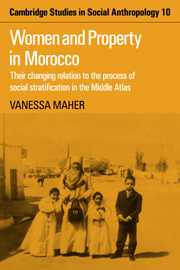 Women and Property in Morocco
Women and Property in Morocco Published online by Cambridge University Press: 27 October 2009
Three organising principles
Social stratification in the Akhdar region today is compounded of a ‘traditional’ system in which membership of social groups is by ascription; and a system of social relations organised by the market, in which birth status has little relevance, and social mobility is feasible. The extent to which market forces affect different sectors of the population and pervade different areas of social life tends to determine whether the ascriptive or market principle of social alignment predominates. The fact that women, and their sphere of activity, are only marginally related to the market has important implications for this thesis.
To attempt to describe stratification in the region in terms of a single series of hierarchically arranged strata would be a gross misrepresentation. I treat stratification as having several dimensions corresponding to different principles of social organisation. Here I discuss those which operate in the absence of a market economy and to which individuals are aligned by ascription. I will consider what changes have been brought about, since pre-Protectorate times, in the system of estates of shurfa, Berbers, Arabs, and haratn; and the tribal system of segmentary groups, strictly speaking vertical sections, within which peasants exercise economic rights by virtue of their membership of a (putative) agnatic community.
Finally, I will attempt to assess how French penetration and modern developments have affected the relative importance of estate, segmentary and market principles of social organisation.
The estate system today
Shurfa. They are the putative descendants of the Prophet.
To save this book to your Kindle, first ensure no-reply@cambridge.org is added to your Approved Personal Document E-mail List under your Personal Document Settings on the Manage Your Content and Devices page of your Amazon account. Then enter the ‘name’ part of your Kindle email address below. Find out more about saving to your Kindle.
Note you can select to save to either the @free.kindle.com or @kindle.com variations. ‘@free.kindle.com’ emails are free but can only be saved to your device when it is connected to wi-fi. ‘@kindle.com’ emails can be delivered even when you are not connected to wi-fi, but note that service fees apply.
Find out more about the Kindle Personal Document Service.
To save content items to your account, please confirm that you agree to abide by our usage policies. If this is the first time you use this feature, you will be asked to authorise Cambridge Core to connect with your account. Find out more about saving content to Dropbox.
To save content items to your account, please confirm that you agree to abide by our usage policies. If this is the first time you use this feature, you will be asked to authorise Cambridge Core to connect with your account. Find out more about saving content to Google Drive.